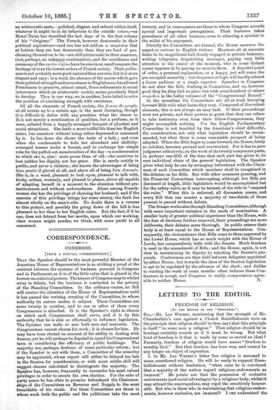CORRESPONDEN CE.
CONGRESS.
[FROM A SPECIAL CORRESPONDENT.]
THAT the Speaker should be the most powerful Member of the American House of Representatives is as striking a proof of the contrast between the systems of business pursued in Congress and in Parliament, as it is of the little value that is placed in the former on oratorical powers. The leisure of Congress may be whiled away in debate, but the business is conducted in the privacy of the Standing Committees. In the ordinary course, no Bill will receive the attention of the House of Representatives until it has passed the revising scrutiny of the Committee, to whose authority its nature makes it subject. These Committees are some twenty in number, and to one or other of them every Congressman is attached. It is the Speaker's right to choose On which each Congressman shall serve, and it is by this authority that he is able so effectually to influence legislation. The Speaker can make or mar both men and measures. The Congressman cannot choose his work ; it is chosen for him. He may have been elected on account of his ability in dealing with finance, yet he will perhaps be deputed to spend his Congressional term in considering the efficiency of public buildings. The majority are, perhaps, desirous of some particular reform ; but if the Speaker is not with them, a Committee of the minority may be appointed, whose report will either be delayed too late in the Session for consideration, or with more subtle skill will suggest clauses calculated to disintegrate the majority. The Speaker has, however, frequently to surrender his most valued privileges in order to secure his own election. For the sake of party peace he has often to promise beforehand the Chairman- ships of the Committees on Revenue and Supply to the most formidable of his rivals. For these Committees are those in whose work both the pablic and the politicians take the most interest, and in consequence are those to whom Congress accords special and important prerogatives. Their business takes precedence of all other business, even to silencing a speaker in the midst of his argument.
Directly the Committees are formed, the House assumes the aspect so curious to English visitors. Members sit at separate desks in its magnificent hall closely engaged in private business, writing telegrams, despatching messages, paying very little attention to the orator of the moment, who in some distant corner appears to be paying no more to them. A disputed point of order, a personal explanation, or a happy jest will rouse the pre-occupied. assembly ; but eloquence or logic will hardly attract a dozen auditors or a single reporter. Speeches in Congress do not alter the Bills drafting in Committee, and so, however good they be, they find no place but with some hundred of others unspoken in the bulky volumes of the "Congressional Record."
In the meantime the Committees are all at work harrying forward Bills with what haste they may. Composed of discordant elements, this is not always an easy task. If their proceedings were not private, and their powers so great that they can refuse to take testimony even from their fellow-Congressmen, they might accomplish nothing. For the English Parliamentary Committee is not troubled by the American's chief difficulty, the consideration, not only what legislation should be recom- mended, but what there is some reasonable prospect of being adopted. When the Bills begin to come forward, the House, lately so indolent, becomes pressed and overworked. For it has to pass judgment collectively, on the work of its twenty component parts, in perhaps one-fifth of the time that each part has given to its own individual share of the general legislation. The Speaker gives what help he can by arranging beforehand with the Chair- man of each Committee which members shall be recognised in the debates on his Bills. But with other measures pressing, and the Financial Committees interrupting, although few Bills are discussed at length, little legislation would be accomplished but for the safety-valve, as it may be termed, of the rule to "suspend the rules." When this is enforced, all discussion ceases, and every Bill that can muster a majority of two-thirds of those present is passed without debate.
The Senate works also through Standing Committees, although with some important variation in the mode of nomination: A smaller body of greater political experience than the House, with the fear of elections further removed, their proceedings are more deliberate, their debates more thorough. In public esteem their body is at least equal to the House of Representatives. Con- sequently, the circumstance that Bills come to them approved by the Lower House, which has so much weight with the House of Lords, has comparatively little with the Senate. Much freedom is used in the amendment of Bills ; and the House, again, is not slow in maintaining its dignity by rejecting the Senate's pro- posals. Conferences are then held between delegates appointed by either House; but towards the close of the Session legislation is apt to be regulated by the advance of the clock ; and dislike to wasting the work of some months often induces these Con- ferences to accept, and Congress to ratify, compromises agree-


































 Previous page
Previous page